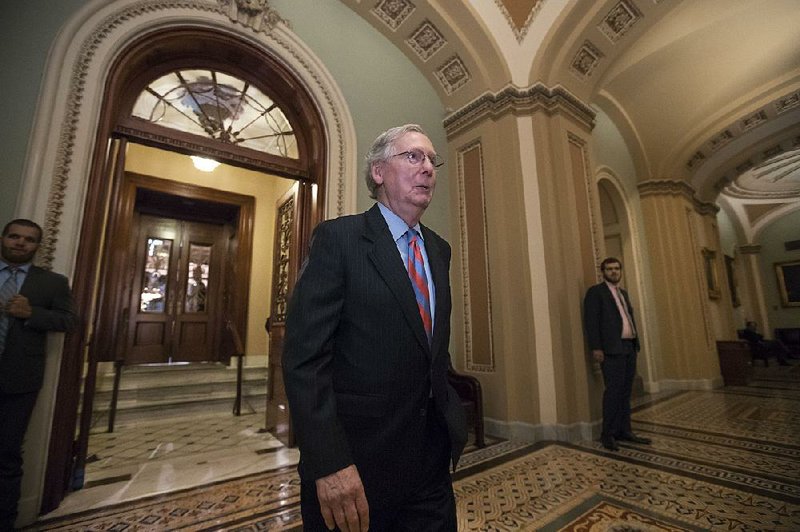WASHINGTON — Buoyed by a signal from House Speaker Paul Ryan, Senate Majority Leader Mitch McConnell introduced a pared-down health care bill late Thursday that he hoped would keep alive Republican ambitions to repeal the Patient Protection and Affordable Care Act.
Votes on the measure were held deep into the night.
McConnell, R-Ky., called his bill the Health Care Freedom Act, but among his colleagues it’s known as “skinny repeal.” It’s intended not to become law but to open a path for a House-Senate conference committee to try to work out comprehensive legislation Congress can pass and send to President Donald Trump.
The bill would repeal the unpopular Affordable Care Act provision that requires most people to have health insurance or risk a fine from the IRS. A similar requirement on larger employers would be suspended for eight years.
Additionally, it would deny funding to Planned Parenthood, and suspend for three years a tax on medical device manufacturers. It would allow states to seek waivers from consumer protections in the Obama-era law, and increase the amount that individuals could contribute to tax-sheltered health savings accounts for medical expenses.
Ryan, R-Wis., opened a path for McConnell earlier Thursday evening by signaling a willingness to negotiate a more comprehensive bill with the Senate. Some Republican senators had been concerned that the House would simply pass the “skinny bill” and send it to Trump. That would have sent a shock wave through health insurance markets, spiking premiums.
Ryan sent senators a statement saying that if “moving forward” requires talks with the Senate, the House would be “willing” to do so. But shortly afterward, his words received varied responses from three GOP senators who’d insisted on a clear commitment from Ryan. It was not immediately clear whether the maneuver would succeed.
“Not sufficient,” said Sen. John McCain, R-Ariz., who returned to the Capitol Tuesday to provide a pivotal vote that allowed the Senate to begin debating the health care bill, a paramount priority for Trump and the GOP. McCain, 80, had been home in Arizona trying to decide on treatment options for brain cancer.
[INTERACTIVE: Compare House, Senate bills with Affordable Care Act]
Sen. Lindsey Graham, R-S.C., initially said “not yet” when asked if he was ready to vote for the scaled-back Senate bill. But later, he told reporters that Ryan had assured him and others in a phone conversation that the House would hold talks with the Senate.
“I feel comfortable personally. I know Paul; he’s a man of his word,” Graham said.
Sen. Ron Johnson, R-Wis., told reporters, “Let’s see how everything turns out here, guys.”
The developments played out as a divided Senate debated legislation to repeal and replace Obama’s Affordable Care Act. With Democrats unanimously opposed, the slender 52-48 GOP majority was divided among itself over what it could agree to.
After a comprehensive bill failed on the Senate floor Tuesday, and a straight-up repeal failed Wednesday, McConnell and his top lieutenants turned toward a lowest-common-denominator solution known as the skinny repeal. It would package repeal of a few of the most unpopular pieces of the 2010 law, along with a few other measures, with the goal of getting something, anything, out of the Senate.
That would be the ticket to negotiations with the House, which passed its own legislation in May.
But that plan caused consternation among GOP senators after rumors began to surface that the House might just pass the skinny bill, rather than negotiate on it, and move on to other issues such as a tax overhaul after frittering away the first six months of Trump’s presidency on unsuccessful efforts over health care.
Ryan responded not long after with a discursive and far from definitive statement that blamed the Senate for being unable to pass anything, but said, “if moving forward requires a conference committee, that is something the House is willing to do.”
Sen. Mike Rounds, R-S.D., said he pretty much took Ryan’s statement as a commitment, but wanted to talk to other senators first.
“If the speaker says they’re not going to the floor with it, then they’re not going to the floor,” Rounds said. “The speaker controls the floor.”
Lobbyists said Republicans were also planning to include a one-year ban on federal payments to Planned Parenthood, extra money for community health centers and waivers for states to permit insurers to sell policies with far narrower coverage than current law allows.
But leaders were encountering problems. The Senate parliamentarian advised that the waiver language violates chamber rules, meaning Democrats could block it. And plans to eliminate Obama’s medical device tax could be abandoned because Republicans need that money for their package.
A bipartisan group of governors, including John Kasich of Ohio and Brian Sandoval of Nevada, announced their opposition to it.
On their own, the changes in the skinny bill could roil insurance markets. Yet the scenario at hand, with senators trying to pass something while hoping it does not clear the House or become law, was highly unusual.
“We’re in the twilight zone of legislating,” said Sen. Claire McCaskill, D-Mo.
MARKET JITTERS
On Thursday, the ongoing uncertainty on Capitol Hill sent jitters through the insurance industry.
Joseph Swedish, the chief executive of Anthem — the nation’s second-largest health insurer — said on a conference call to review second-quarter earnings that the company is reassessing its participation in Affordable Care Act marketplaces for next year. Anthem has decided to largely withdraw from the markets in three of the 14 states it participates in, and he said it may stop participating elsewhere unless the markets seem stable.
The Blue Cross Blue Shield Association warned that even the skinny repeal Republicans now envision could undermine the individual-insurance market because it would eliminate the individual mandate. The measure, which remains subject to negotiation, also would likely eliminate the Affordable Care Act’s requirement that employers with 50 workers or more provide health coverage, and a medical device tax that generates $19.6 billion in federal revenue over a decade.
And America’s Health Insurance Plans, a major insurance trade association, weighed in with a letter Thursday saying it opposes “targeted proposals that would eliminate key elements of current law without new stabilizing solutions.”
Still, the stock market appeared stable, with health care companies in the Standard & Poor’s 500 Index up 16 percent this year, beating the overall market’s 11 percent gain. Insurers, the companies tied most closely to the Affordable Care Act, are up even more — at 23 percent.
Wall Street’s apparent indifference to the possibility that Republicans will succeed in repealing the Affordable Care Act shows how the for-profit health industry has largely separated itself from the law’s fate. While the law provided insurance to 20 million people, drugmakers say it hasn’t boosted their profits. Publicly traded insurers have largely quit the health law’s markets after losing money. And hospitals have bigger problems, tied to structural shifts in how people are getting care.
“It’s really steady as she goes,” said Les Funtleyder, a health investor at E Squared Capital Management. “Most of the stocks are basically calling the Congress’s bluff, in that really nothing material is going to happen.”
Information for this article was contributed by Erica Werner, Alan Fram, Ricardo Alonso-Zaldivar, Stephen Ohlemacher and Kevin Freking of The Associated Press and by Laura Litvan, Arit John and Zachary Tracer of Bloomberg News.


